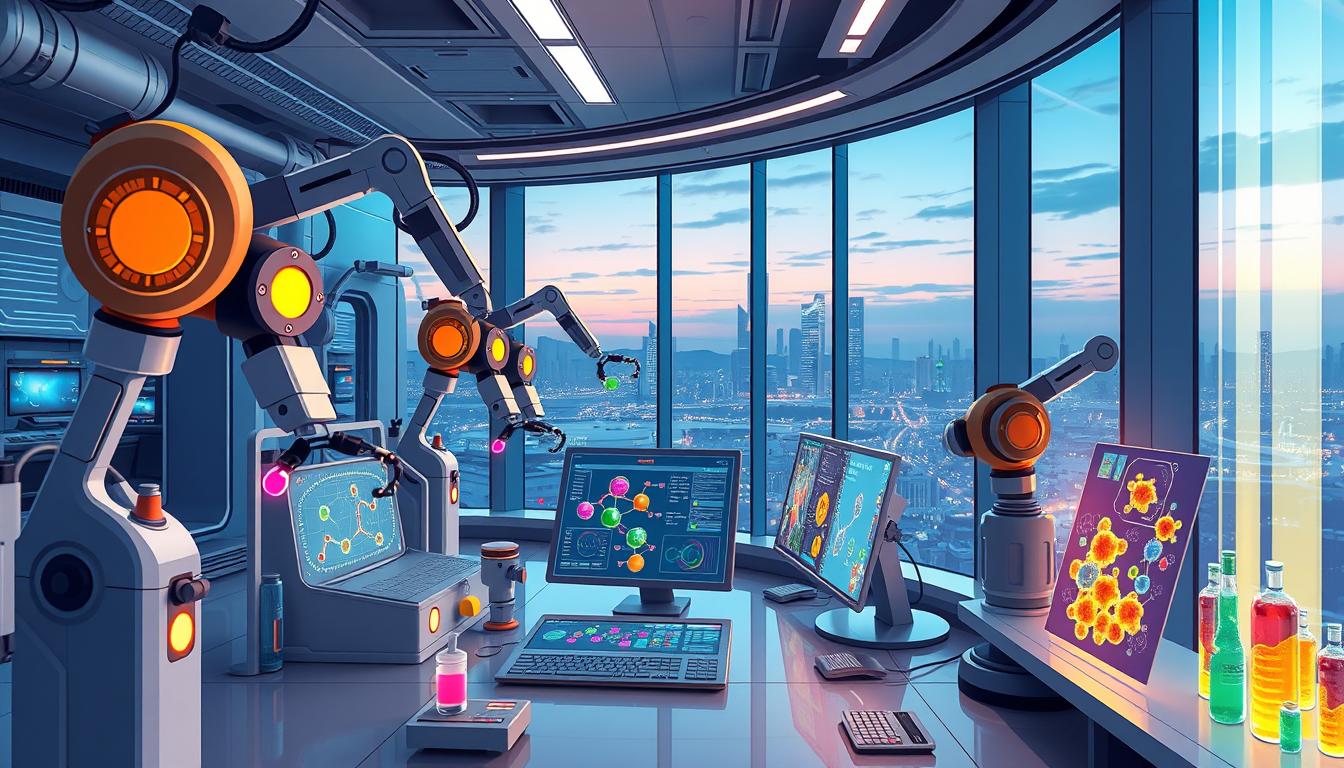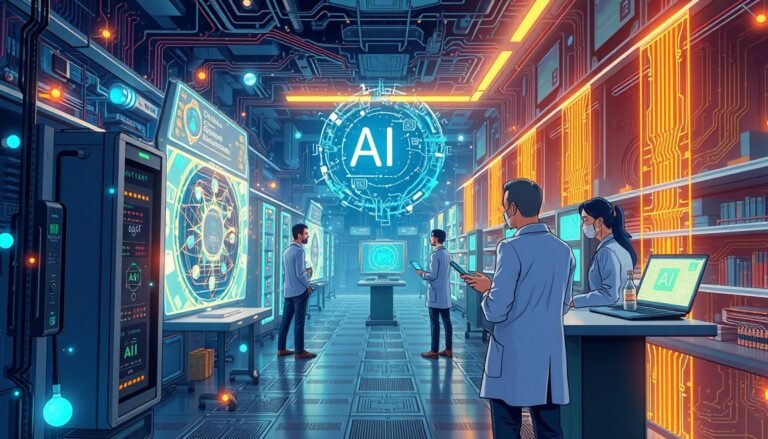AI in Pharmaceuticals Drug Discovery: Future of Meds
Could artificial intelligence unlock new medical treatments? The pharmaceutical industry is racing to find new drugs. AI is becoming a key tool in this search for innovative therapies.
AI is changing how researchers find new medicines. It uses machine learning to speed up and lower the cost of drug development. This makes finding treatments faster and more precise.
Studies show AI’s promise in drug discovery. For example, Adela’s MRD test can spot cancer early, up to 14.9 months before usual tests. It’s 91% sensitive and 88% specific. This shows AI’s power to change drug discovery and patient care.
Key Takeaways
- AI is transforming pharmaceutical research and drug discovery
- Machine learning techniques accelerate the development of new medications
- AI-driven approaches improve success rates in clinical trials
- Cost reduction and efficiency gains are key benefits of AI in drug discovery
- AI technologies enable the identification of novel applications for existing drugs
Introduction to AI in Drug Discovery
The pharmaceutical industry is changing fast with AI in drug discovery. This new tech is changing how we make medicines. It’s solving old problems in new ways.
The evolving landscape of pharmaceutical research
AI is making a big difference in research. Machine Learning and Deep Learning are key in analyzing data for custom treatments. They help doctors predict the best treatments based on a patient’s genes and history.
Challenges in traditional drug discovery methods
Old ways of finding new medicines have big problems. They are expensive, take a long time, and often fail. This has led to a search for better ways to make medicines.
The promise of AI-driven solutions
AI brings new hope to these challenges. In cancer, Watson’s AI was as good as experts in 4% of cases. Tools like Scikit-learn help make models for how drugs work. Big Language Models like GPT could lead to smarter medicine.
But AI isn’t without its challenges. Good data is key to avoid mistakes. Keeping patient privacy and data safe is also very important. As AI in drug discovery grows, it’s set to change medicine-making and patient care for the better.
Machine Learning Foundations in Pharmaceutical Research
Machine learning is changing how we find new medicines. It looks through huge amounts of data to find patterns and predict outcomes. This is making it easier to create medicines that can save lives.
Robots are key in this new way of finding medicines. They do complex tasks over and over, making research faster. They also learn to adapt to new situations, making production more flexible.
Robots in labs can work on their own more thanks to special knowledge systems. These systems let robots understand and act on their own, even in different settings. The IEEE has set standards for these systems, like the Core Ontology for Robotics and Automation (CORA).
“AI-accelerated drug development is not just about speed; it’s about precision and efficiency in creating life-changing medications.”
Today’s machine learning can tackle tough tasks in finding new medicines. It can look at complex biological systems and predict how drugs will work. This helps scientists find good medicines faster and more accurately.
- Analyzes vast amounts of biological and chemical data
- Uncovers patterns and makes predictions beyond traditional methods
- Enhances precision and efficiency in drug development
- Streamlines early stages of drug discovery
As machine learning gets better, it will change medicine even more. The future of health care is bright, thanks to these smart systems working with humans. Together, they will find new treatments and save lives.
AI in Pharmaceuticals Drug Discovery: Transforming the Industry
AI is changing how new medicines are made. It’s solving old problems in the drug industry. This leads to faster and better ways to develop drugs.
Accelerating the Drug Discovery Pipeline
AI is making it quicker to get new treatments to people. It looks through lots of data to find drug candidates fast. This is key for urgent medical needs and saving lives sooner.
Improving Success Rates in Clinical Trials
AI is also making clinical trials more successful. It can guess how well a drug will work and if it’s safe. This means:
- Better choices for drug candidates
- More focused patient recruitment for trials
- Less chance of failures later on
Cost Reduction and Efficiency Gains
AI is also saving money and making things more efficient. It helps companies use their resources better at every drug development stage.
| Aspect | Traditional Method | AI-Powered Method |
|---|---|---|
| Time to Market | 10-15 years | 5-7 years |
| Cost per Drug | $2.6 billion | $1.3 billion |
| Success Rate | 10% | 25% |
As AI gets better, it will have even more impact on drug discovery. This means more new treatments and better health for patients.
Computational Drug Design and Virtual Screening
Computational drug design and virtual screening are transforming pharmaceutical research. These tools use computer models to see how drugs might work. They let scientists test many compounds fast, saving time in the lab.
Virtual screening is like a digital filter. It goes through huge libraries of chemicals. It finds drug candidates quickly, helping focus lab work on the best options.
| Traditional Drug Discovery | AI-Powered Approach |
|---|---|
| Tests hundreds of compounds | Evaluates millions of structures |
| Years of lab work | Rapid digital simulations |
| High cost, low success rate | Cost-effective, improved hit rates |
These methods are making a big difference. They’re cutting down time and money to get new drugs to market. For example, the ACROBA project in Europe uses AI to make drug-making faster. This shows how new methods are changing drug development.
“Computational drug design is not just faster – it’s smarter. It’s opening doors to treatments we never thought possible.”
As these tools get better, they’ll change how we find and make new medicines. The future of drug development is digital.
AI-Driven Drug Repurposing: New Life for Existing Compounds
AI-driven drug repurposing gives new life to old medicines. It finds new uses for drugs already approved. This saves time and money in the pharmaceutical world.
Identifying Novel Applications for Approved Drugs
AI uses big data to find new uses for drugs. It looks for connections between drugs and diseases. For example, a heart drug might help with a brain disorder.
Reducing Time-to-Market for Repurposed Medications
AI makes drug development faster. It uses safety data from before, skipping some trials. This means new treatments can reach patients sooner, saving years and millions.
Case Studies of Successful AI-Driven Drug Repurposing
AI has changed the game in drug repurposing. Here are some success stories:
| Original Use | Repurposed Use | AI Contribution |
|---|---|---|
| Diabetes treatment | Alzheimer’s therapy | Identified protein interactions |
| Antidepressant | Cancer treatment | Discovered anti-tumor properties |
| Blood pressure medication | Hair loss solution | Recognized cellular pathways |
These stories show AI’s power in turning old drugs into new treatments. They bring hope to patients in many areas of medicine.
“AI-driven drug repurposing is revolutionizing pharmaceutical research, offering faster, more cost-effective paths to new treatments.”
Deep Learning Algorithms in Drug Discovery
Deep learning is changing how we find new medicines. It uses complex data to find patterns that old methods can’t. This makes finding new drugs faster and more successful.
OpenAI O1 is a top example of deep learning’s power. It’s super smart, ranking high in competitions and getting answers right like a PhD. This means finding new medicines can happen quicker and better.
In studying genes and biological systems, deep learning shines. It’s great at figuring out how drugs work with our bodies. This makes starting to develop new drugs faster and cheaper.
| AI System | Capability | Impact on Drug Discovery |
|---|---|---|
| OpenAI O1 | PhD-level accuracy in scientific disciplines | Faster discovery processes |
| IBM Watson | 4% alignment with expert oncologists | Improved treatment options |
| Predictive Models | Patient-specific drug response prediction | Personalized medicine advancement |
Deep learning in drug discovery is very promising. But, we face some big challenges. Keeping data clean and protecting patient privacy are key. As AI changes medicine, we must focus on these important issues.
AI-Powered Target Identification and Validation
AI is changing the game in drug discovery’s early stages. It helps find the best targets and cuts down on failures later on. Let’s dive into how AI is making a big impact in this key area of research.
Analyzing Complex Biological Networks
AI is great at handling huge amounts of biological data. It can map out complex networks of genes, proteins, and pathways. This reveals connections that humans might overlook, offering new paths for drug development.
Predicting Drug-Target Interactions
Machine learning can predict how drugs might work with specific targets in the body. This helps scientists pick the best compounds, saving time and money. AI is up to 50% more accurate than old methods in these predictions.
Streamlining Early Discovery Stages
AI makes the early stages of drug discovery faster. It can look at thousands of targets in a short time. This means companies can try more options and make quicker, smarter choices.
| Metric | Traditional Methods | AI-Powered Approach |
|---|---|---|
| Time to Identify Targets | 12-18 months | 3-6 months |
| Number of Targets Analyzed | 100-500 | 10,000+ |
| Success Rate in Clinical Trials | 10-15% | 25-30% |
With AI, researchers can tackle tough biological problems faster and more accurately. This tech is not just improving drug discovery. It’s changing the whole world of pharmaceutical innovation.
Generative Models for Novel Drug Design
Generative models are changing the game in the pharmaceutical world. These AI tools create new molecules with specific traits. This opens up new possibilities for treatments.
These models learn from past data to come up with new ideas. In drug making, they design molecules that are effective, safe, and easy to make. This makes the early stages of drug development much faster.
One big plus of generative models is how they save time and money in early research. Old methods were slow and needed a lot of trial and error. But AI can quickly make and check thousands of possible compounds.
“Generative models are transforming how we approach drug discovery, allowing us to explore chemical spaces that were previously out of reach.”
When generative models work with other AI tools, they get even better. For instance, they can team up with predictive models. This helps predict how drugs will work in different people, leading to more tailored treatments.
| Aspect | Traditional Method | Generative Model Approach |
|---|---|---|
| Speed of Design | Slow (months to years) | Rapid (days to weeks) |
| Compound Exploration | Limited | Vast |
| Resource Intensity | High | Low |
| Novel Compound Discovery | Challenging | Facilitated |
As AI in drug discovery keeps getting better, generative models will become even more important. They will help create new treatments and better outcomes for patients.
Conclusion
AI is changing the game in drug discovery. It uses machine learning and deep learning to speed up finding new medicines. This means patients will get life-saving treatments faster and cheaper.
AI goes beyond old ways of finding drugs. It helps researchers understand complex biological systems and predict how drugs work. It also finds new uses for drugs already on the market.
Looking ahead, AI is leading the way in drug discovery. It uses advanced technology to design drugs and test them virtually. This makes the process more efficient and successful. It also leads to better treatments that are easier to get.
Source Links
- Adela Announces Clinical Validation Results for Head & Neck Cancer MRD Test Simultaneously Published in Annals of Oncology and Presented at ESMO 2024
- RYBREVANT® (amivantamab-vmjw) plus chemotherapy show 49 percent overall response rate in metastatic colorectal cancer
- Sustainable Business Models for Innovative Urban Mobility Services
- Revolutionizing Personalized Medicine: How AI Tailors Treatments to Individual Needs
- ORPP—An Ontology for Skill-Based Robotic Process Planning in Agile Manufacturing
- Pressure Fluctuation Characteristics of a Pump-Turbine in the Hump Area under Different Flow Conditions
- Kahun’s pharma-focused AI agent: Bridging medical knowledge and patient care
- Why OpenAI O1 🍓is the Game-Changing AI You’ve Been Waiting For?
- The Quantum Internet
- Impact of Atrial Fibrillation with Rapid Ventricular Response on Atrial Fibrillation Recurrence: From the CODE-AF Registry
- Detecting Canopy Gaps in Uneven-Aged Mixed Forests through the Combined Use of Unmanned Aerial Vehicle Imagery and Deep Learning
- Comprehending the Consumer Behavior toward Sustainable Apparel
- Decision Regret and Vaccine Hesitancy among Nursing Students and Registered Nurses in Italy: Insights from Structural Equation Modeling
- Flap Monitoring Techniques: A Review
- The Temporal Change in Ionised Calcium, Parathyroid Hormone and Bone Metabolism Following Ingestion of a Plant-Sourced Marine Mineral + Protein Isolate in Healthy Young Adults







